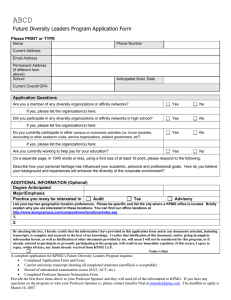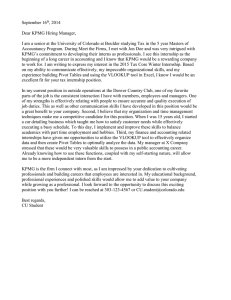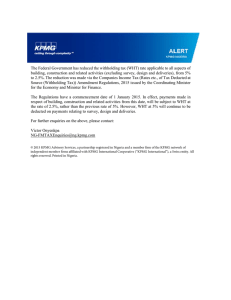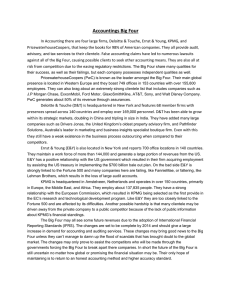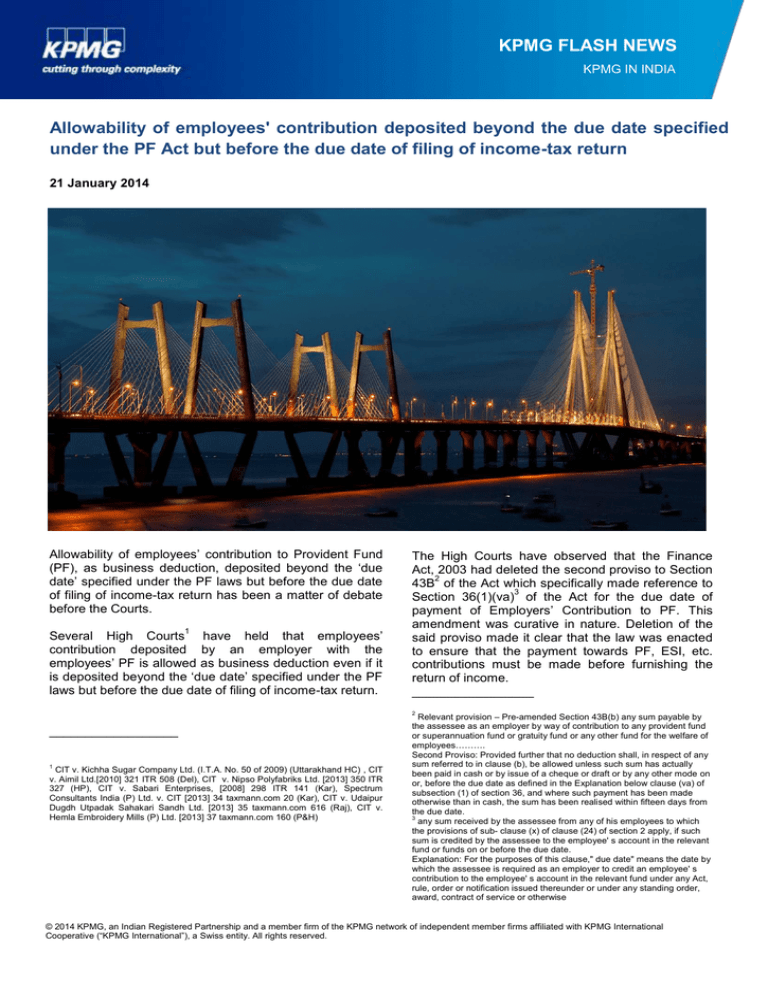
KPMG FLASH NEWS
KPMG IN INDIA
Allowability of employees' contribution deposited beyond the due date specified
under the PF Act but before the due date of filing of income-tax return
21 January 2014
Allowability of employees’ contribution to Provident Fund
(PF), as business deduction, deposited beyond the ‘due
date’ specified under the PF laws but before the due date
of filing of income-tax return has been a matter of debate
before the Courts.
1
Several High Courts have held that employees’
contribution deposited by an employer with the
employees’ PF is allowed as business deduction even if it
is deposited beyond the ‘due date’ specified under the PF
laws but before the due date of filing of income-tax return.
The High Courts have observed that the Finance
Act, 2003 had deleted the second proviso to Section
2
43B of the Act which specifically made reference to
3
Section 36(1)(va) of the Act for the due date of
payment of Employers’ Contribution to PF. This
amendment was curative in nature. Deletion of the
said proviso made it clear that the law was enacted
to ensure that the payment towards PF, ESI, etc.
contributions must be made before furnishing the
return of income.
_________________
2
__________________
1
CIT v. Kichha Sugar Company Ltd. (I.T.A. No. 50 of 2009) (Uttarakhand HC) , CIT
v. Aimil Ltd.[2010] 321 ITR 508 (Del), CIT v. Nipso Polyfabriks Ltd. [2013] 350 ITR
327 (HP), CIT v. Sabari Enterprises, [2008] 298 ITR 141 (Kar), Spectrum
Consultants India (P) Ltd. v. CIT [2013] 34 taxmann.com 20 (Kar), CIT v. Udaipur
Dugdh Utpadak Sahakari Sandh Ltd. [2013] 35 taxmann.com 616 (Raj), CIT v.
Hemla Embroidery Mills (P) Ltd. [2013] 37 taxmann.com 160 (P&H)
Relevant provision – Pre-amended Section 43B(b) any sum payable by
the assessee as an employer by way of contribution to any provident fund
or superannuation fund or gratuity fund or any other fund for the welfare of
employees……….
Second Proviso: Provided further that no deduction shall, in respect of any
sum referred to in clause (b), be allowed unless such sum has actually
been paid in cash or by issue of a cheque or draft or by any other mode on
or, before the due date as defined in the Explanation below clause (va) of
subsection (1) of section 36, and where such payment has been made
otherwise than in cash, the sum has been realised within fifteen days from
the due date.
3
any sum received by the assessee from any of his employees to which
the provisions of sub- clause (x) of clause (24) of section 2 apply, if such
sum is credited by the assessee to the employee' s account in the relevant
fund or funds on or before the due date.
Explanation: For the purposes of this clause," due date" means the date by
which the assessee is required as an employer to credit an employee' s
contribution to the employee' s account in the relevant fund under any Act,
rule, order or notification issued thereunder or under any standing order,
award, contract of service or otherwise
© 2014 KPMG, an Indian Registered Partnership and a member firm of the KPMG network of independent member firms affiliated with KPMG International
Cooperative (“KPMG International”), a Swiss entity. All rights reserved.
Though Section 43B(b) of the Act is related to employers’
contribution, the High Courts have held that there is no
reason to make distinction between the employees’
contribution and the employers’ contribution. Once the
contribution is made, whether by the employee or by the
employer, it is a contribution to a welfare fund held in a trust
by the employer, who is bound to deposit the same. When
the employer does not deposit the same within the time
prescribed under the Welfare Acts, such as the Provident
Fund Act, ESI Act etc., the employer may face criminal
prosecution under the said Act. The employer may also
become liable to pay interest or penalty. However, that
cannot be a reason to deny him the benefit of Section 43B
of the Act, which starts with a non obstante clause and
which clearly lays down that the taxpayer can take benefit
of deduction of such contributions, if the same are paid
before furnishing the return of income.
Section 2(24)(x) of the Act also refers to any sum
received by the taxpayer from his employees as
contribution and does not refer to employers’
contribution. Therefore, with respect to any sum
received by the taxpayer from any of his
employees to which provisions of Section 2(24)(x)
of the Act applies, the taxpayer shall not be
entitled to deduction unless such sum is credited
to the employees’ account in the relevant fund or
funds on or before the due date specified under
Section 36(1)(va) of the Act.
The Supreme Court’s decision in the case of Alom
Extrusions Ltd. is distinguishable on the facts of
the present case since in that case the controversy
was with respect to shortfall in employers’
contribution and retrospective application of
amendment in Section 43B of the Act made by the
Finance Act, 2003. Therefore, it is not applicable
to the facts of the present case.
Accordingly, it was held that employees’
contribution deposited by an employer with the
employees’ PF is not allowed as business
deduction under Section 36(1)(va) of the Act if it is
deposited beyond the ‘due date’ specified under
the PF laws but before the due date of filing of
income-tax return for the relevant year.
4
On the other hand some of the Courts and Tribunal have
held that employees’ contribution to PF can be allowed as a
deduction only if the same is deposited before the due date
specified in the relevant statues i.e. PF and ESIC laws.
Further the deductibility of the employees’ PF payments
has to be seen only with reference to Section 36(1)(va) of
the Act and these provisions have never changed since its
introduction in the statute. Therefore, deduction would only
be available where the payment is made by the due date,
i.e., under the relevant Act.
Recently, the Gujarat High Court in the case of Gujarat
5
State Road Transport Corporation dealt with this
controversy and held as follows:
Section 43B of the Act has been amended by the
Finance Act, 2003. However, there was no
corresponding amendment in Section 36(1)(va) of the
Act and therefore, amendment made in Section 43B is
required to be confined to Section 43B alone and it
cannot be made applicable to Section 36(1)(va) of the
Act.
The amendment made in Section 43B of the Act, by the
Finance Act, 2003, is not applicable to Section
36(1)(va) of the Act since the amended Section 43B,
applies only to employers’ contribution and not to the
employees’ contribution.
On the other hand recently, the Rajasthan High Court
6
in the case of Jaipur Vidyut Vitran Nigam Ltd has held
that since the entire amount was deposited by the
taxpayer on or before the due date of filing of the
return of income under Section 139 of the Act, the
employees’ PF contribution cannot be disallowed
either under Section 43B or under Section 36(1)(va) of
the Act.
It is pertinent to note that the Gujarat High Court in the
decision of Gujarat State Road Transport Corporation
has dealt with the Supreme Court and other High
Courts decisions and held that employees’
contribution deposited by an employer with the
employee’s PF is not allowed as business deduction
under Section 36(1)(va) of the Act if it is deposited
beyond the ‘due date’ specified under the PF laws but
before the due date of filing of income-tax return for
the relevant year. However, Rajasthan High Court in
the case of Jaipur Vidyut Vitran Nigam Ltd has not
dealt with relevant High Court decisions while dealing
with this controversy.
_____________
4
ITO v. LKP Securities Ltd. (ITA No. 638/Mum/2012), CIT v. Pamwi Tissues Ltd.
[2008] 215 CTR 150 (Bom), DCIT v. Bengal Chemicals & Pharmaceuticals Ltd. [2011]
11 taxman.com 328 (Kol)
5
CIT v. Gujarat State Road Transport Corporation (Tax Appeal No 637 of 2013) –
Taxsutra.com
_____________
6
ITO v. Jaipur Vidyut Vitran Nigam Ltd (ITA No. 278/2011) – itatonline.com
© 2014 KPMG, an Indian Registered Partnership and a member firm of the KPMG network of independent member firms affiliated with KPMG International
Cooperative (“KPMG International”), a Swiss entity. All rights reserved.
www.kpmg.com/in
Ahmedabad
Commerce House V, 9th Floor, 902
& 903,Near Vodafone
House,Corporate Road,
Prahlad Nagar,
Ahmedabad – 380 051
Tel: +91 79 4040 2200
Fax: +91 79 4040 2244
Bangalore
Maruthi Info-Tech Centre
11-12/1, Inner Ring Road
Koramangala, Bangalore 560 071
Tel: +91 80 3980 6000
Fax: +91 80 3980 6999
Chandigarh
SCO 22-23 (Ist Floor)
Sector 8C, Madhya Marg
Chandigarh 160 009
Tel: +91 172 393 5777/781
Fax: +91 172 393 5780
Chennai
No.10, Mahatma Gandhi Road
Nungambakkam
Chennai 600 034
Tel: +91 44 3914 5000
Fax: +91 44 3914 5999
Delhi
Building No.10, 8th Floor
DLF Cyber City, Phase II
Gurgaon, Haryana 122 002
Tel: +91 124 307 4000
Fax: +91 124 254 9101
Hyderabad
8-2-618/2
Reliance Humsafar, 4th Floor
Road No.11, Banjara Hills
Hyderabad 500 034
Tel: +91 40 3046 5000
Fax: +91 40 3046 5299
Kochi
4/F, Palal Towers
M. G. Road, Ravipuram,
Kochi 682 016
Tel: +91 484 302 7000
Fax: +91 484 302 7001
Kolkata
Infinity Benchmark, Plot No. G-1
10th Floor, Block – EP & GP,
Sector V Salt Lake City,
Kolkata 700 091
Tel: +91 33 44034000
Fax: +91 33 44034199
Mumbai
Lodha Excelus, Apollo Mills
N. M. Joshi Marg
Mahalaxmi, Mumbai 400 011
Tel: +91 22 3989 6000
Fax: +91 22 3983 6000
Pune
703, Godrej Castlemaine
Bund Garden
Pune 411 001
Tel: +91 20 3050 4000
Fax: +91 20 3050 4010
The information contained herein is of a general nature and is not intended to address the circumstances of any particular individual or entity. Although we
endeavour to provide accurate and timely information, there can be no guarantee that such information is accurate as of the date it is received or that it will continue
to be accurate in the future. No one should act on such information without appropriate professional advice after a thorough examination of the particular situation.
© 2014 KPMG, an Indian Registered Partnership and a member firm of the KPMG network of independent member firms affiliated with KPMG International
Cooperative (“KPMG International”), a Swiss entity. All rights reserved.
© 2014 KPMG, an Indian Registered Partnership and a member firm of the KPMG network of independent member firms affiliated with KPMG International
The KPMG (“KPMG
name, logo
and “cutting athrough
complexity“
are reserved.
registered trademarks of KPMG International Cooperative (“KPMG International”), a Swiss entity.
Cooperative
International”),
Swiss entity.
All rights

